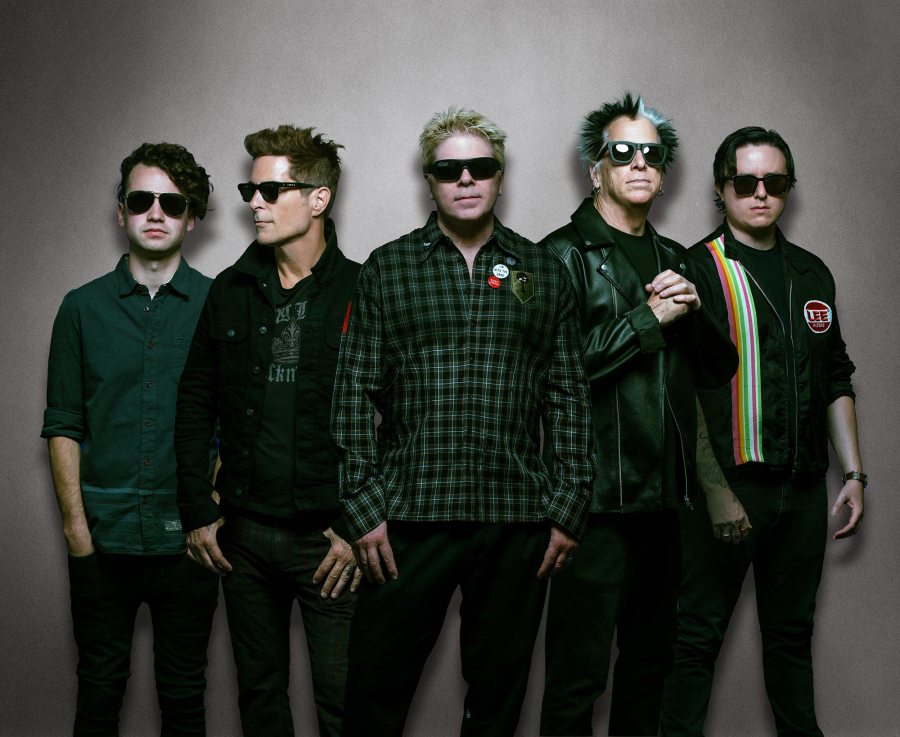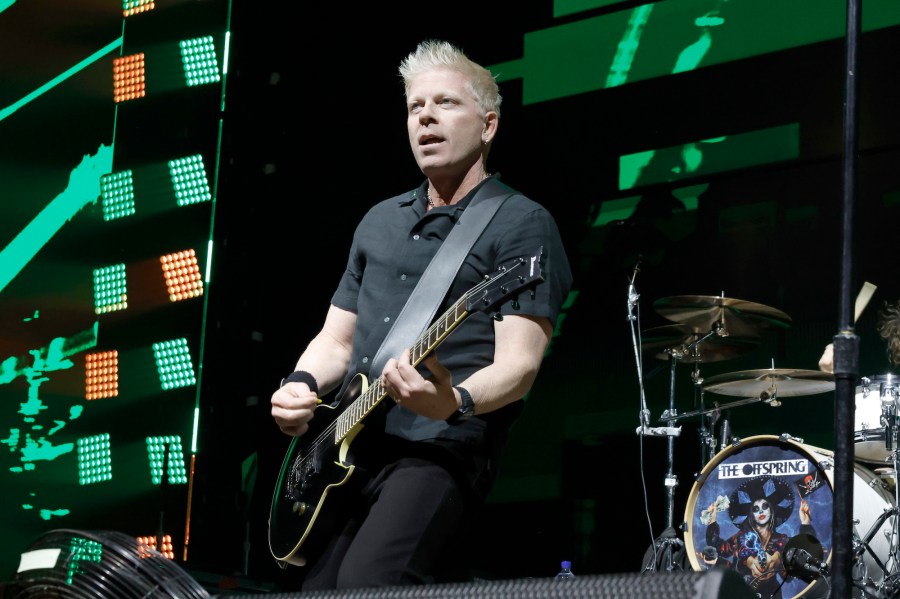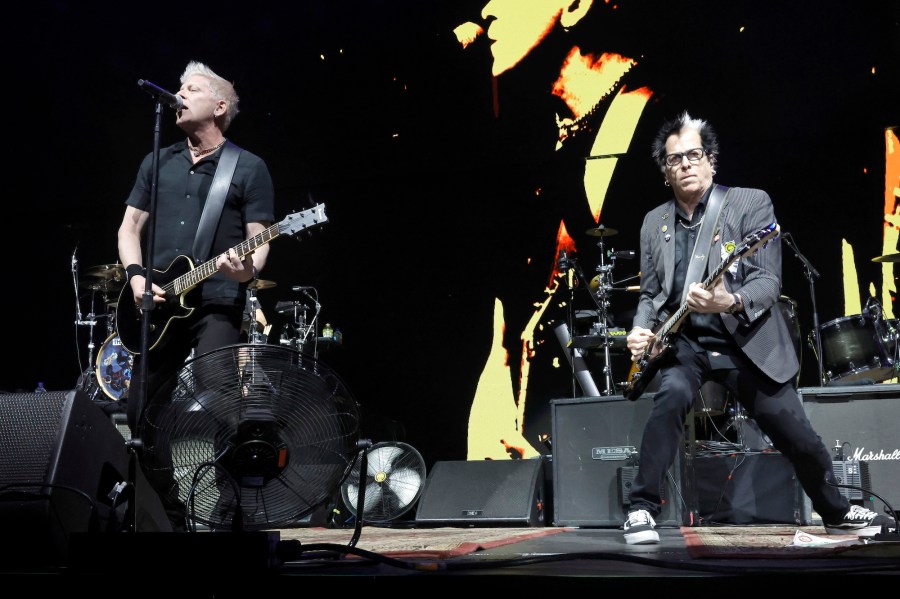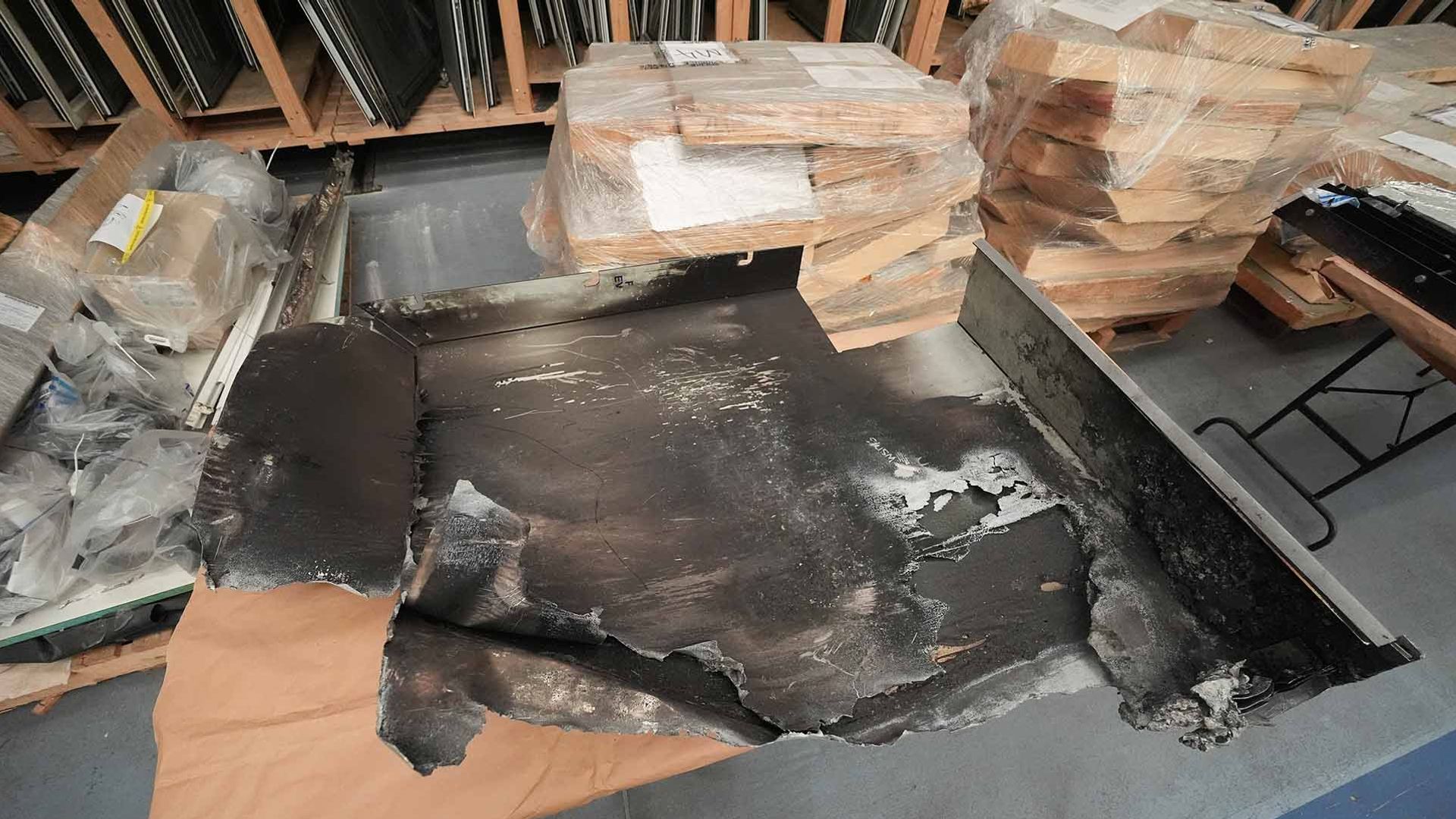
“You gotta keep ‘em separated.” With five words, The Offspring created one of the most memorable moments of the 1990s.
“Come Out and Play,” the lead single from the band’s 1994 album, Smash, helped usher in a golden age of punk rock. Smash also took this group of punk rock misfits from Orange County, California, and skyrocketed them into levels of success they had not dreamed of.
“We were taking guesses at how much this record [Smash] would sell worldwide,” said guitarist Noodles (Kevin Wasserman) when he and vocalist Dexter Holland spoke exclusively with Us Weekly ahead of their takeover of The Punk Rock Museum in Las Vegas from April 12 to 14.
“I think Ignition’s [sales] was at about 40,000? Is that right?” pondered Noodles, referring to the band’s 1992 record. “Still, that was punk rock standards. We weren’t thinking about mainstream success at all when we went in to make Smash.”
Albums Turning 30 in 2024: Madonna, TLC and More
Holland agreed. “Yeah, we really jumped a lot [in numbers],” he told Us. “So we felt like we had some momentum, which was exciting. We thought there was really a ceiling, which was, at that time, Bad Religion. They sold whatever it was, maybe 100,000, maybe 200,000 even? And that was just insane. But nothing even close to what might be considered a punk band or a pop-punk band had broken at that point. So we really thought that that was as high as it could go.”
Smash went on to smash all expectations. In its first year, the album sold more than five million copies in the U.S. alone, according to Rolling Stone. It reached No. 4 on the Billboard 200. Four months after its release, the RIAA certified Smash both gold and platinum, the first record on indie label Epitaph to achieve that status (it went triple-platinum by the end of 1994 and has since been certified six-times platinum.) By 2012, over 11 million copies of the album had been sold worldwide.
The album spawned three songs that became staples of MTV and alternative rock radio: the teenage alienation anthem of “Self-Esteem,” the angst and anxiety-riddled “Gotta Get Away” and the aforementioned “Come Out and Play,” a song documenting the gang and school violence Holland witnessed in East L.A. The signature line — “You gotta keep ‘em separated” — was sung by the band’s friend Jason “Blackball” McLean.
“It was the last song that we recorded for Smash, so it was almost an afterthought in a way,” Holland told Us. “And I had the idea for a voiceover basically because I knew that I couldn’t pull off that kind of cholo voice. I had no idea where that was going to come from. So it was kind of thrown together, I suppose.”
And how do Holland and Noodles feel about their breakthrough single being almost an afterthought? “It’s a good thing we did it,” Holland said with a laugh. “It doesn’t encourage the planning and preparation [we did] — ‘just go in off the seat of your pants and maybe it’ll all turn out.’ But it is funny how things work like that sometimes.”
He continued, “You’ve heard that mantra that 90 percent of the work happens in the last 10 percent. Maybe there was something to that where we just got into that zone at the very end where it was so focused and so intense that we just kind of pulled it together.”
Making Smash was not always so fortuitous. Holland and Noodles said that Epitaph had booked them 20 days to record the album — “And it wasn’t 20 consecutive days,” they clarified. They had to call the studio to see if anyone was in, and if nobody was, “we would get it for half the price.”
“The whole of it was very tight,” recalled Holland. “[20 days] wasn’t very long, back in those days — very little money. We shared a guitar amp that we pooled our money for. So, just that fact that we pulled it off something that so unlikely is [incredible].”
The Offspring’s Smash and Green Day’s Dookie (released a month prior) are credited with elevating punk into the mainstream, a momentum that continued throughout 1994 with landmark releases from Bad Religion (Stranger Than Fiction), Rancid (Let’s Go), Jawbreaker (24 Hour Revenge Therapy) and more. That year, grunge was descending in popularity, and audiences were craving the energy and sound coming out of Southern California.
Suddenly, The Offspring — a band who had been together for 10 years before Smash — were overnight successes, which led to the group feeling guilty over their fame and fortune.

“There was a discomfort for the whole thing, for sure. Embarrassment,” Holland admitted, while Noodles said that the band was left “unsure” about the whole experience. “Do we deserve this?” he said. “Is this real? There was uncertainty, for sure.”
Holland added that the success resulted in The Offspring “being looked at differently by your friends, peers, old fans, all that stuff. Feeling like, ‘Hey, we just made three months ago, that record was the same record that it is now, it’s just looked at much differently by people.‘ And trying almost to convince people we are the same.”
Everything to Know About 2024’s Music Festivals: Coachella and More
The guilt resulted in The Offspring turning down a performance on Saturday Night Live at the height of their new success. “In hindsight, I wish we had done it,” Holland confessed. “At the time, we really felt like we were just a garage band a few months before. We hadn’t played a show bigger than 500 people. And to put us on a national live television show, we just thought it was probably going to be a disaster in terms of our performance. Maybe not? Maybe it would’ve been OK, and maybe it just would’ve captured the moment, but it just felt really uncomfortable to put ourselves up to that.”
For Noodles, that imposter syndrome still lingers, even four decades into the band’s career. “We still have the saying to this day, ‘we’re almost like a real band,’ and we certainly feel like that back then,” he told Us. “We’ve got to keep upping our game in order to deserve whatever success we’ve got. And we still kind of feel like that.”
Smash was, at the time, the bestselling album ever released on an independent label (per Rolling Stone), but The Offspring’s widespread success and popularity put them at odds with the punk community. “If some guy’s little sister likes your band, then forget it,” Holland quipped. “There’s a perception when a band becomes well-known that it’s not cool with some people anymore. We fought that in terms of trying to stick to what we thought was right. We stayed on the independent label throughout the record cycle. We didn’t do a lot of magazine [features] or covers. But at the end of the day, what can you do?”
Holland added that he and the band didn’t want to overstate their struggles. “Most of it’s been great, for sure,” he said. “There are always the negative voices. It was strange thinking, ‘Here we are, having joined this punk band 10 years ago because we didn’t fit in.’ You join this punk community that you feel accepts you, and then all of a sudden, you get successful, and you get ostracized. That was a strange position to be in, and that did last a little while.”
The band mostly laughed off the times they failed the punk rock purity test. Noodles remembered how Maximum RockNRoll, the venerable publication known for its strict attitudes about what was punk (think Pitchfork before there was Pitchfork), gave Smash a good review when it first came out. “And then we got on MTV and started selling copies of it, and all of a sudden, we became the hated capitalists,” he joked. “It changed overnight, and it was ridiculous.”
Holland cited another moment of “the change in perception,” telling Us, “[Smash] got reviewed in Rolling Stone, which was like, ‘Oh my gosh, that’s huge.’ It didn’t happen until four or five months after the record had broke. And they gave it three, so not terrible, not great. Three. And I just thought it was funny because they said, ‘It doesn’t have the depth of Dinosaur Jr., or Nirvana, or whatever.’ It was so weird that all of a sudden, it’s being judged in a completely different light from where it was created from, or intended for.”
Three decades years later, Smash has found its audience and its place in the hall of punk rock history. The band is celebrating this accomplishment by taking over The Punk Rock Museum in Las Vegas next month. A special pop-up exhibit will feature memorabilia and never-before-seen photos from famed photographer Lisa Johnson. Noodles will provide guided tours for fans, while bassist Todd Morse and guitarist Jonah Nimoy will guest DJ at the Triple Down Bar. There will also be an intimate Q&A session with the band and a short acoustic performance.
“I still love these songs,” Noodles said. “‘Come Out and Play’ still sounds as fresh to me as it ever did. ‘Self Esteem,’ the same way. Some of the faster ones, ‘Nitro,’ and songs like that, I’m looking forward to busting those out.”

As to why Smash endures 30 years later, Holland explained, “We were in our mid- to late 20s, so I think you do have some of those feelings, a real uncertainty about who you are, where you’re going, and what will happen. I certainly did. So maybe some of the lyrics reflect that or just capture different angles. Maybe even funny angles, like ‘Self Esteem,‘ is kind of laughing at not having self-esteem.”
Reflecting on the band’s lasting success, Holland concluded, “But maybe it’s just one of those times where we were definitely getting better, but [Smash] still was flawed enough that it made it sound real. Some of my favorite albums like Operation Ivy’s [Energy] are certainly not professional records, but they have a real sense about them that makes you just love them because it feels real. It makes the emotion feel real.”









